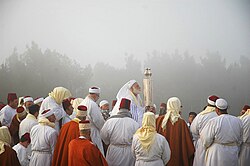How do we make difficult decisions as Disciples of Christ?
How do we determine what is right and wrong? What should we wear, and what
should we not wear? What shall we eat? What day must we worship?
The Gospels and Epistles, our Scriptures, never really spell
out to us the minutia of God’s law. Or do they? Did you know that there are
more than 613 commandments in the gospels and epistles alone, many of which are
impossibly demanding?
If we think other religions are more stringent, let us
compare some requirements with that of following the Messiah. For example,
another religion may require anywhere from three to five to seven sessions of
prayer a day. Not so with us – we are supposed to pray all the time,
everywhere, as much as possible, without any form of hypocrisy,
without any meaningless repetition, without pride, in sincere petition. In
other religions, we may have to thank God for certain things – food, shelter,
blessings – but we have to be thankful and give thanks and bless God for
everything, in good circumstances and in bad, in life or in death. We cannot
pray as in Judaism – that is simply not enough. We cannot pray as the heathens
– is in not acceptable. We have to pray the prayers that God wants to hear from
us.
I exhort therefore, that, first of all,
supplications, prayers, intercessions, and
giving of thanks, be made for all men; For kings, and for all that are in authority; that we may lead a
quiet and peaceable life in all godliness and honesty. For this is good and acceptable in the sight of God our
Saviour; Who will have all men to be saved, and to come unto the knowledge of
the truth.
(1Ti 2:1-4 KJV)
I will therefore that men pray every where,
lifting up holy hands, without wrath and doubting.
(1Ti 2:8 KJV)
I thank my God upon every remembrance of you,
Always in every prayer of mine for you all making request with joy,
(Php 1:3-4 KJV)
Rejoice evermore. Pray without ceasing. In
every thing give thanks: for this is the will of God in Christ Jesus concerning
you.
(1Th 5:16-18 KJV)
And when thou prayest, thou shalt
not be as the hypocrites are: for
they love to pray standing in the synagogues and in the corners of the streets,
that they may be seen of men. Verily I say unto you, They have their reward.
But thou, when thou prayest, enter into thy closet,
and when thou hast shut thy door, pray to thy Father which is in secret; and
thy Father which seeth in secret shall reward thee openly. But when ye pray, use not vain repetitions, as the
heathen do: for they think that they shall be heard for their much
speaking. Be not ye therefore like unto them:
for your Father knoweth what things ye have need of, before ye ask him. After this manner therefore pray ye: Our Father which art
in heaven, Hallowed be thy name. Thy kingdom
come. Thy will be done in earth, as it is
in heaven. Give us
this day our daily bread. And forgive us our
debts, as we forgive our debtors. And lead us
not into temptation, but deliver us from evil: For thine is the kingdom, and
the power, and the glory, for ever. Amen. For
if ye forgive men their trespasses, your heavenly Father will also forgive you:
But if ye forgive not men their trespasses, neither
will your Father forgive your trespasses.
(Mat 6:5-15 KJV)
Wow! Here’s another “Thou shalt not”. Messiah Himself commands us that
“Thou shalt not be as the hypocrites.” Who says the Torah is legalism and the
NT is completely different – a form of lawlessness?
But… the NT is seriously lacking in detail! It does not tell us, exactly
what we should pray. The Messiah gives us only one written prayer, the Lord’s
Prayer “Avinu shebashamayim”, but then also forbids us
ritualistic repetition? What are we supposed to do the rest of the ceaseless
time of prayer?
The NT never specifically tells us what day to worship, what to wear, or
what to eat? It does mention freedom – but does freedom mean we can live as we
please and do as we like? The NT portrays quite the opposite – liberty itself
is a law. We are to walk in liberty and thus not be entangled again from
everything which the Messiah set us free from.
1 Corinthians 5:1-13 speaks of the “old leaven”. I believe that Paul is
speaking of the things of our past life – our bondage in “Egypt” to sin. We are
supposed to leave behind and purge away all the leaven of selfishness, pride,
immorality, etc. because in Christ we have been made free from those things of
Egypt. That is past – we have gone through the waters of cleansing and to look
back is unbelief and warrants God’s destruction.
I will therefore put you in remembrance, though ye once knew this, how that
the Lord, having saved the people out of the land of Egypt, afterward destroyed
them that believed not.
(Jud 1:5 KJV)
Christ did not set us free to serve ourselves – the Messiah set us to free
to serve Him and to serve others. He broke us from the carnal, beastly, animal
nature of selfishness and the human-inherited nature of sin.
Stand fast therefore in the liberty wherewith
Christ hath made us free, and be not entangled again with the yoke of bondage.
(Gal 5:1 KJV)
For, brethren, ye have been called unto liberty;
only use not liberty for an occasion to
the flesh, but by love serve one another.
(Gal 5:13 KJV)
But whoso looketh into the perfect law of
liberty, and continueth therein, he
being not a forgetful hearer, but a doer of the work, this man shall be blessed
in his deed.
(Jas 1:25 KJV)
So speak ye, and so do, as they that shall be
judged by the law of liberty.
(Jas 2:12 KJV)
For so is the will of God, that with well doing
ye may put to silence the ignorance of foolish men: As free, and not using your liberty for a cloke of maliciousness, but as
the servants of God. Honour all men.
Love the brotherhood. Fear God. Honour the king.
(1Pe 2:15-17 KJV)
So, here are the
guidelines by which we live life and make decisions:
1)
The Will of God – we are to
present ourselves to God as “living sacrifices” to hear from Him His will for
us and to obey it. We must only do the things that are pleasing in His sight
2)
Love for God – we are
required to love God and to do all the things that He commands us.
3)
The Holy Spirit guides us,
teaches us truth, gives us wisdom and understanding, etc.
Unser Gottes Im Himmel is the law that we must
abide by.
What about doubtful things? Romans 14 gives us a clue.
1)
Whatever we do, we must to
it to God and as belonging to God.
2)
We should not judge or
condemn others.
3)
We are accountable to God
alone for our actions.
4)
No food is unclean of
itself, but each much follow his own conscience with what he feels is right.
5)
The Kingdom of God is
more than eating and drinking.
6)
We must heed the voice of
our conscience and show consideration to others, being peacemakers
at all times.
7)
We must do all things to
edify others and to glorify God. In all things we must have fear of God
and show deference to others.
All things are lawful for me, but all things are
not expedient: all things are lawful for me, but all things edify not. Let no
man seek his own, but every man another's wealth.
Whatsoever is sold in the shambles, that
eat, asking no question for conscience sake: For the earth is the Lord's, and the fulness thereof. If any of
them that believe not bid you to a feast,
and ye be disposed to go; whatsoever is set before you, eat, asking no question
for conscience sake. But if any man say unto you, This is offered in sacrifice
unto idols, eat not for his sake that shewed it, and for conscience sake: for
the earth is the Lord's, and the fulness
thereof: Conscience, I say, not thine own, but of the other: for why is my
liberty judged of another man's conscience?
For if I by grace be a partaker, why am I evil spoken of for that for which I
give thanks? Whether therefore ye eat, or drink, or whatsoever ye do, do all to
the glory of God. Give none offence, neither to the Jews, nor to the Gentiles,
nor to the church of God: Even as I please all men
in all things, not seeking mine own
profit, but the profit of many, that
they may be saved.
(1Co 10:23-33 KJV)
But I have used none of these things: neither
have I written these things, that it should be so done unto me: for it were better for me to die, than that any man
should make my glorying void. For though I preach the gospel, I have nothing to
glory of: for necessity is laid upon me; yea, woe is unto me, if I preach not
the gospel! For if I do this thing willingly, I have a reward: but if against
my will, a dispensation of the gospel is
committed unto me. What is my reward then? Verily
that, when I preach the gospel, I may make the gospel of Christ without charge,
that I abuse not my power in the gospel. For though I be free from all men, yet have I made myself servant unto all,
that I might gain the more. And unto the Jews I became as a Jew, that I might
gain the Jews; to them that are under the law, as under the law, that I might
gain them that are under the law; To them that are without law, as without law,
(being not without law to God, but under the law to Christ,) that I might gain
them that are without law. To the weak became I as weak, that I might gain the
weak: I am made all things to all men,
that I might by all means save some. And this I do for the gospel's sake, that
I might be partaker thereof with you.
Know ye not that they which run in a race run all, but one receiveth the prize?
So run, that ye may obtain. And every man that striveth for the mastery is
temperate in all things. Now they do it
to obtain a corruptible crown; but we an incorruptible. I therefore so run, not
as uncertainly; so fight I, not as one that beateth the air: But I keep under
my body, and bring it into subjection:
lest that by any means, when I have preached to others, I myself should be a
castaway.
(1Co 9:15-27 KJV)
Finally, to underline our guiding law with a further
stamp from God’s Word, let us examine Romans 2.
For as many as have sinned without law shall also
perish without law: and as many as have sinned in the law shall be judged by
the law; (For not the hearers of the law are
just before God, but the doers of the law shall be justified. For when the
Gentiles, which have not the law, do by nature the things contained in the law,
these, having not the law, are a law unto themselves: Which shew the work of
the law written in their hearts, their conscience also bearing witness, and their thoughts the mean while accusing or else
excusing one another;) In the day when God shall judge the secrets of men by
Jesus Christ according to my gospel. (Rom 2:12-16 KJV)
What is conscience? Conscience is the law of God written on our heart. And
it is not only for those without law, but also for those who were given the law
because it was said in the Torah, “vehayu hadevarim haeileh asher anokhi
metzavekha haiyom al-levavekha”, meaning “These words which I command you today
shall be in your heart”.
“What is the law of God?”, or to express it better, “What
then is the guiding principle of God eternal law?”
“Love God, love others.” “Serve God, serve others.”
What about me? What about my pleasure, my individuality? I
am supposed to be all things to all men, to please and glorify God, and
consider others better than myself?
How does the NT regard our individuality?
For ye are dead, and your life is hid with Christ
in God.
(Col 3:3 KJV)
I am crucified with Christ: nevertheless I live;
yet not I, but Christ liveth in me: and the life which I now live in the flesh
I live by the faith of the Son of God, who loved me, and gave himself for me.
(Gal 2:20 KJV)
But now are they
many members, yet but one body.
(1Co 12:20 KJV)
That there should be no schism in the body; but that the members should have the same care one
for another.
(1Co 12:25 KJV)
For as we have many members in one body, and all
members have not the same office: So we, being
many, are one body in Christ, and every one members one of another.
(Rom 12:4-5 KJV)
















